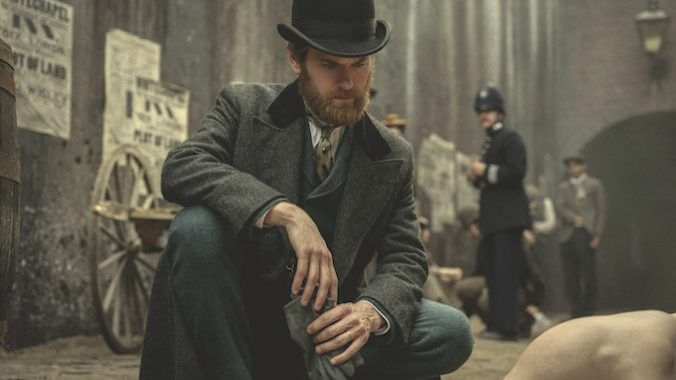Netflix’s Bodies Adaptation Wastes an Intriguing Story on Generic Clichés
Photo Courtesy of Netflix
While fighting my way through Netflix’s latest 8-episode murder mystery limited series, Bodies, I kept coming back to the same thought: in the hands of a more capable writer-showrunner, this show could have become another remarkable triumph. Based on Si Spencer’s DC Comics/Vertigo graphic novel of the same name, Paul Tomalin’s historical crime drama has an intriguing and intricate source material to lean on, but you won’t really get to see that fully realized by watching its TV adaptation. Its uninspired execution is so painfully generic and dull that the best it can hope for is being compared to better and more ambitious series like the streaming service’s excellent German hit Dark. That’s a shame because, with a more delicate and imaginative approach (perhaps on another network), this narrative could have paid off tremendously.
The series begins in 2023 London, where Detective Sergeant Hasan (Amaka Okafor) is lured by a teenager to a naked man’s dead body at Longharvest Lane. The unknown victim is missing an eye (presumably due to a gunshot wound, though there’s no bullet) and has a tattoo on his left wrist. The same body is also found in three other time periods (1890, 1941, and 2053) at the exact same location by three different detectives who start investigating the murder. It doesn’t take long to figure that there’s some sort of time travel involved in all cases that connect a group of people in the past, present, and the future—and they have no idea how substantial their roles are in discovering the nude John Doe.
We follow each investigator simultaneously as they put the pieces together to unravel the identity of the victim and find the killer responsible. Ultimately, the clues lead to one mysterious man (Stephen Graham), who seems to be the key to finding an answer to the inexplicable. But he’s only the tip of the iceberg in a universe-altering chain of events that spans decades, and leads to global conjunctures that play a crucial role in changing history.
However, before we get to the most intriguing aspects of these complex timelines, the series attempts to establish the protagonists separately to make us emotionally invested from the start. Unfortunately, their personal dramas are rather underwhelming and only seem to stand in the way of getting to the central mystery. Don’t get me wrong, it makes perfect sense to deepen these characters from the get-go, who later will connect in various ways (though on separate timelines), but their individual struggles are largely clichés we have seen dozens of times before.
It doesn’t help that, regardless of whether we are in the past or the future, the atmosphere always comes across as superficial and featureless. Despite the social climate and the settings aptly conveying each period, an element of quality seems to be missing to make them feel lived-in and palpable. Even in the undeveloped age of 1890 and the war-torn England of 1941, everything seems too groomed and impeccable, which comes across as somewhat inauthentic. Whenever we’re transported into a different time, it’s difficult to not think of these eras as manufactured environments that only exist to serve the plot.
-

-

-

-

-

-

-

-

-

-

-

-

-

-

-

-

-

-

-

-

-

-

-

-

-

-

-

-

-

-

-

-

-

-

-

-

-

-

-

-








































